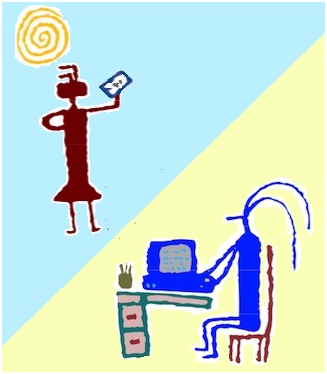I’m an advocate for accessibility on the World Wide Web. I’m not a web designer, but I am a human, and just as I want every person to be able to easily enter a public building and see a movie, get a passport, buy a meal, enjoy artwork, get medical care, complain to the management, etc., I want every person to be able to access the critical information and services they need via the Internet. Accessibility isn’t just nice to do in a web site design – it’s a sign of respect. It’s a human right. And a site that doesn’t try to be accessible is, to me, a sign of profound disrespect.
Just how distressing and painful an inaccessible web site can be was brought home for me recently: an elderly neighbor needed to put her sweet, beloved 12-year-old dog down. She was heartbroken. It was important to her for this procedure to be done in her own home, so she could be there at the moment of his death – something she couldn’t do in a vet’s office because of COVID-19 precautions. She booked an appointment through a company that specializes in euthanasia for pets at home via phone. Then she went online to pay. Her only Internet access is through her Android phone. She went through the very lengthy online form four times, and four times, she got to the end and there was a frowny face and the words, “Show you are human.” She didn’t understand what it meant. She clicked everywhere she could think of, hit return over and over and, each time, would have to go back and start all over. She was in tears by the time she texted me, begging for help.
I had to make the appointment for her on my Apple laptop, and I was confused by the form several times – it often wasn’t clear which field box went with which field box description. When I got to the end of the form, I was presented with a captcha – that’s what wasn’t working on her smartphone when she was trying to pay. By the end of the process, we were both even more stressed out – we had wanted to focus that day on saying goodbye to a beloved friend, and instead, we were both emotionally drained by an inaccessble web site.
How many older people have been in the same position because of an inaccessible web site? How many people have been urgently trying to make an appointment, pay a bill, get critically-needed information, and have been frustrated and even demoralized by an inaccessible web site? How many web sites have literally made people cry?
These accessibility recommendations from the State of Illinois are a good place to start in making a web site more accessible.
And the keyword #WebWeWant on Twitter is a good one to follow.
Also see:
- My quest for an accessible web site of my own.
- Human rights, the digital divide & web accessibility Video, 4:40 minutes.
- How Volunteers Can QUICKLY Help Your Program To Be More Accessible Online
- Are Accessible Web Sites Only For Companies That Can Afford Professional Web Designers?
- United Nations site for people with disabilities is inaccessible

If you have benefited from this blog or other parts of my web site or my YouTube videos and would like to support the time that went into researching information, developing material, preparing articles, updating pages, etc. (I receive no funding for this work), here is how you can help.

